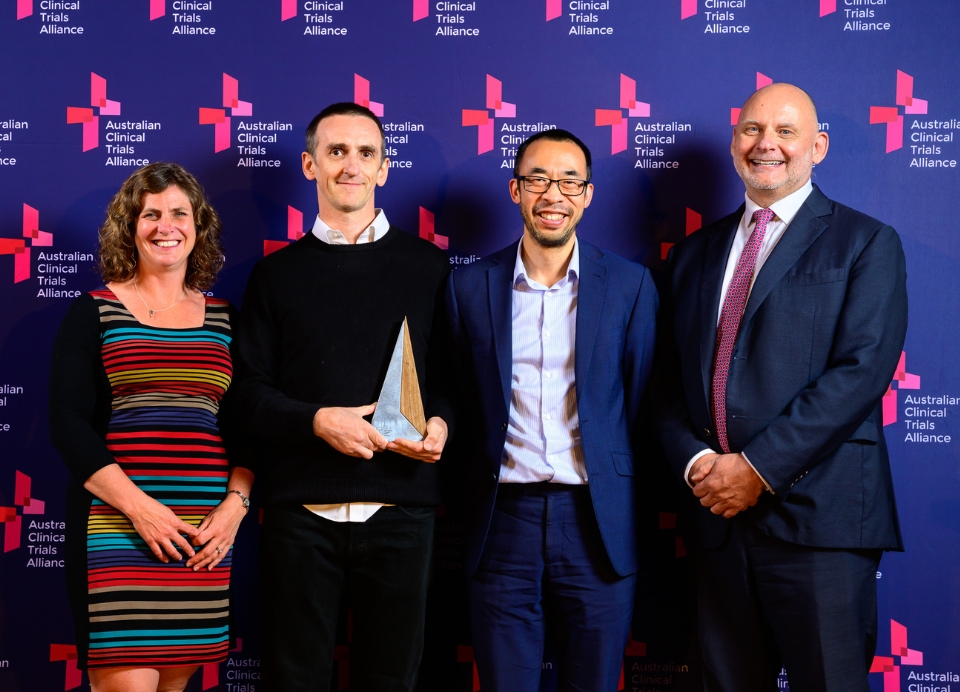In recognition of advancing clinical practice and improving patient lives, the international COVID-19 clinical trial led by researchers from the Doherty Institute has been bestowed the Australian Clinical Trials Alliance (ACTA) STInG Excellence in Trial Statistics Award.
The Australasian COVID-19 Trial (ASCOT), was recognised by ACTA for conducting a groundbreaking collaborative, multicentre and investigator-driven clinical trial.
ASCOT, one of the largest Australian-led clinical trials for COVID-19, aims to generate clinical evidence about treatment of hospitalised patients with COVID-19. The trial investigated different types of treatments – including antiviral and anticoagulation (blood thinning) therapies – in different healthcare settings, including low- and middle-income countries (LMIC).
The team worked with The George Institute for Global Health, whose mandate was overseeing clinical trial operations in India and Nepal. They also collaborated with Health and Clinical Analytics of the University of Sydney on statistical design and analytics.
Patients hospitalised with COVID-19 are at increased risk of developing life-threatening blood clots. University of Melbourne’s Clinician Researcher at the Doherty Institute and Chief Investigator of ASCOT, Professor Steven Tong, said the team examined the impact of different blood thinning strategies on patients hospitalised with COVID-19.
“As an adaptive platform trial, ASCOT provides the flexibility to remove ineffective interventions and introduce new ones. This was crucial during a pandemic, when there was a lot of rapidly generated data from other international trials demonstrating which treatments were effective or not. In ASCOT, we tested four different anticoagulation strategies, dropping one strategy and introducing a higher dose strategy during the trial period,” said Professor Tong.
Professor Bala Venkatesh, a Professorial Fellow of the Critical Care Program at The George Institute, said the ASCOT trial, one of the few studies to have a major involvement of low- and middle-income countries, addressed a critical gap in the evidence in healthcare delivery.
“Even when the case numbers were low in Australia and New Zealand, our established network facilitated the extension of the trial to India and Nepal, where COVID-19 was more active and we could successfully complete a study which would have global relevance. The rapid recruitment of subjects during the difficult time of the Delta wave is a testimony to the commitment of site investigators and study staff in these regions,” said Professor Venkatesh.
Upon receiving the award, Dr Mark Jones, Senior Biostatistician from the Health and Analytics Team at the University of Sydney, acknowledged the large team behind this success.
“It’s an honour to receive this award, which recognises the efforts of a large team across Australia, New Zealand, India and Nepal. Our thanks go to study participants, hospital staff, the research teams and, of course, the statisticians who designed, analysed and reported on the trial.”
The results of the trial, published in NEJM Evidence, indicate that an intermediate dose of blood-thinning medication may be most effective in treating patients hospitalised with COVID-19.
ASCOT is supported by the Australian Partnership for Preparedness Research on Infectious Disease Emergencies (APPRISE), the BHP Foundation, the Health Research Council (HRC) of New Zealand, the Hospital Research Foundation, the Macquarie Group Foundation, the Minderoo Foundation, the Pratt Foundation, the Royal Brisbane and Women’s Hospital Foundation, the Common Good (the Prince Charles Hospital Foundation), Snow Medical Research Foundation, Wesley Research Institute, Chong Kun Dang Pharmaceutical Corp, the NSW Office for Health and Medical Research, the Medical Research Future Fund (MRFF) and the Russell and Womersley Foundation.
More updates and news from the Doherty Institute
